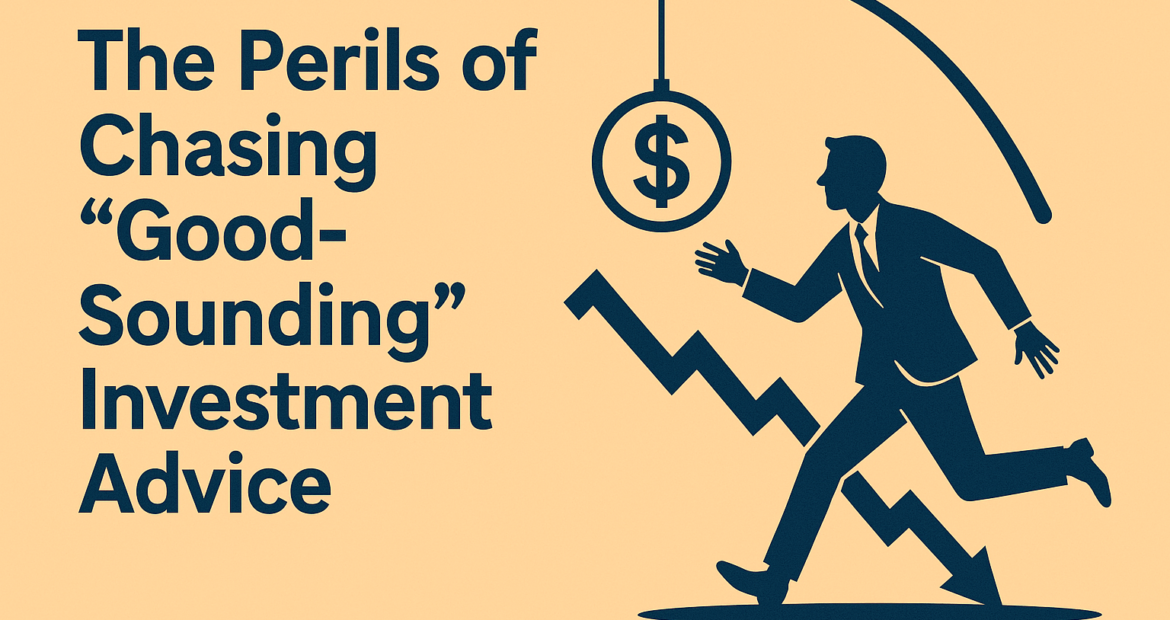When it comes to investing, there is a timeless truth that Jason Zweig captured perfectly – ‘While people need good advice, what they want is advice that sounds good.’ It is a sentiment that rings true for anyone who has ever been tempted by the promise of quick riches or a foolproof shortcut to financial success.
The advice that sounds the best in the short run – get rich quick, double your money overnight, follow the hottest trend. This is almost always the most dangerous in the long run. Yet, the allure persists. We all want the secret, the key, the roadmap to that mythical primrose path leading to El Dorado: a magical, low-risk, high-return investment that defies the laws of financial gravity.
The problem? That path does not exist. And chasing it can lead us straight into a ditch.
The siren song of hot returns
It is human nature to gravitate toward what is working right now. When a friend brags about tripling their money on a meme stock, or a headline screams about the latest cryptocurrency moonshot, our ears perk up. FOMO – fear of missing out – kicks in, and suddenly we are ready to pile into whatever has been hottest, convinced that the party will keep going indefinitely. Meanwhile, we shun what has gone cold: the boring SIP investing.
This chase is fueled by advice that sounds irresistible: ‘Act now before it is too late!’, ‘This is the next big thing!’, “Do not miss the boat!” It is exciting. It is urgent. It makes us feel like we are in on something special.
But, here is the catch: what sounds good today often turns into tomorrow’s regret. Markets are cyclical, and yesterday’s winners are rarely tomorrow’s champions. By the time the crowd rushes in, the smart money is usually on its way out.
The long game: Why boring wins
Contrast this with the kind of advice we actually need, but rarely want to hear. Things like: invest consistently, diversify, focus on the long term, and avoid chasing trends. It’s not flashy. It doesn’t come with the promise of overnight millions or a story you can brag about at the next dinner party.
But here’s the truth — it works.
Research shows that disciplined, long-term SIP investing consistently beats quick-money schemes over time. Especially if you stay patient during market dips.
Take the Nifty 50, for example. Historically, it’s delivered an average annual return of about 12% over the long haul. Sure, that’s not a number that grabs headlines. It won’t double your money in a year. But over 30 years, thanks to the power of compounding, it can turn a modest nest egg into a small fortune.
Now, compare that to the hot stock tip you chased last year — the one that’s now down 70%.
Good advice doesn’t dazzle. It delivers.
The Emotional Trap
So. why do we keep falling for the shiny stuff? It is not just about greed; it is about emotion. Investing is as much a psychological game as it is a financial one. We are wired to seek instant gratification, to follow the herd, to believe we can outsmart the system. Advice that sounds good plays right into those impulses. It tells us what we want to hear: that wealth can be easy, that risk is optional, that we are special enough to beat the odds.
Good advice, on the other hand, forces us to confront reality. It asks us to be patient, to ignore the noise, to accept that losses are part of the journey. It the financial equivalent of eating your vegetables – necessary, but not exactly thrilling. And that is why it is so easy to brush off until we have learned our lesson the hard way.
How to spot dangerous advice
If we are going to protect ourselves from the siren song of ‘good sounding’ advice, we need to know what to watch out for. Here are a few red flags –
1. Promises of guaranteed high returns with low risk: If it sounds too good to be true, it is. Risk and reward are inseparable in investing. Anyone claiming otherwise is either delusional or trying to sell you something.
2. Urgency and scarcity: ‘Act now or miss out!’ is a sales tactic, not an investment strategy. Real wealth-building does not hinge on a 24-hour window.
3. Over-reliance on past performance: Just because something has been hot does not mean it will stay that way. Past returns are not a crystal ball.
4. Complexity for complexity’s sake: If the pitch involves jargon you do not understand, it is probably more about dazzling you than helping you.
A better path forward
So, what is the alternative?
Start with a simple, unglamorous plan. Define your goals – retirement, a house, financial independence – and build a portfolio that matches your timeline and risk tolerance.
Stick to the basics – diversified equity, a sprinkle of bonds, an element of gold and maybe a few individual stocks if you are feeling adventurous. Automate your contributions so you are not tempted to time the market. And most importantly, tune out the noise.
The next time someone tries to sell you on El Dorado, remember that the real treasure lies in consistency, not chasing fool’s gold.
Zweig was right! We crave advice that tickles our ears and feeds our fantasies. But, the path to financial security is not paved with primroses – it is built with patience, discipline, and a healthy dose of skepticism. The sooner we embrace that, the less likely we are to wake up wishing we’d listened to the boring stuff all along.
Author:
Raghu Prasad R,
Certified Financial Planner













